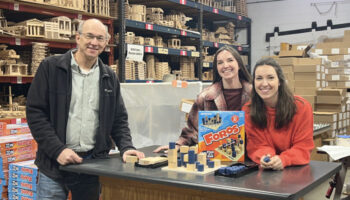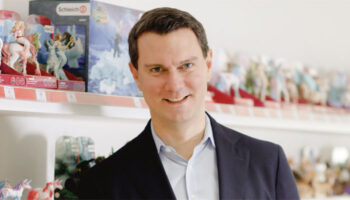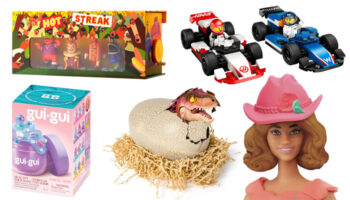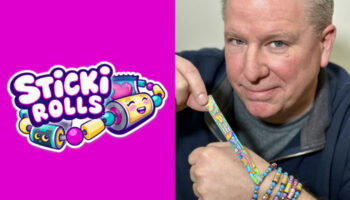That’s Crypto, Bro: Designer Alfie Dix on the inspiration behind the award-nominated game

Thanks for making time, Alfie. You’re the inventor of a game that’s currently nominated for a 2025 Gift of the Year award. What category are you nominated in and what ‘s the name of the game?
The name of the game is That’s Crypto, Bro. And I believe we’re nominated in the Games and Puzzles category – which is amazing; I didn’t expect that. It’s great for the game; I’m really happy about it.
Excellent – congratulations to you and to Bubblegum Stuff! And tell me: what’s the big idea behind That’s Crypto, Bro?
It’s a hidden-information party game; a fast-paced card game where you aim to earn the most points by collecting hidden coins. You can use action cards to look at values, steal from other people and rig the market. Part of the fun is working out the value of hidden crypto coins, which have funny animal-related names…
Donkey Dosh, Raccoon Doubloons…
Yes! We had quite a lot of fun making up different names! So there are different cryptocurrencies, some of which are hidden at the start… You’ve got to switch cryptocurrencies, look at certain coins and play cards from your hand to garner information about where these coins are. You want to collect the highest value crypto and try to increase the value of crypto cards.
And how did the idea for this come about, Alfie?
So I did a week’s internship at Bubblegum Stuff with Courtney Wood and his team. Do you know Courtney?

I do, I adore Courtney! We’ve interviewed him a couple of times. I’ll put in links to his pieces here and here. He’s never offered me an internship, though…
Ha! Well, this would’ve been in the summer of my first year at uni. We met when I got to attend a meeting at a boardgame designer event. I asked him if he had any opportunities because I was looking for work experience, or an internship – any of that kind of stuff. He said he had a week free. And so I went to where they’re based near Canary Wharf and they had this list of Post-It Notes on the wall…
Ah, yes! The idea wall…
Right! The wall’s covered in Post-It Notes; all sorts of things they want to work on that aren’t fully fleshed out. I won’t say what kind of things are on there, obviously, but one of the Post-It’s just said ‘crypto’. And at that time crypto was a big topic; it had been on everyone’s minds for quite a while. Anyway, that just caught my eye. Over the course of that week, that became the first game I made for them.
That’s amazing!
Well, to be honest, I don’t think they expected much of me… Ha!
Ha! No, I very much doubt that. So how quickly did the game come together?
I came up with the name and initial design within the first two days, I think… I made a concept and prototyped it very early. Then there was a lot of fine tuning! Of course, Bubblegum Stuff had to make all of these graphic designs for it, building it out to look fantastic. It’s taken a while to get to where we are now but I’m very pleased with it. And we have another idea coming soon, hopefully.

Fantastic. I know the wall of which you speak so I love that you looked at that on day one and the wheels immediately started turning. And just to clarify: how did you come to be in a meeting with Courtney in the first place?
I went to a meeting that my mother was invited to for designers and publishers because – as I think you know – my mother is a board game designer…
Ah! Indeed: Ellie Dix. Hugely respected inventor; quite brilliant. And in that respect, is it an advantage to have that background? Or is it a bit intimidating?
Oh, it’s an amazing advantage. It’s ridiculous! I mean, I’m so lucky – and taking full advantage of it. Ha! I’m reaping all the rewards of her hard work, not least of all because she has all these interesting connections. I’ve met with incredibly experienced designers; even had dinner with some of them in Essen… I’m very lucky to able to be able talk to talk to them in such a casual setting.
Amazing!
I’ve also been able, a couple of times, to sit in on meetings with publishers. Not high-intensity meetings, but catch-up meetings. I think that’s a great way to learn. I probably wouldn’t be able to get my foot in the door this early on without that connection – let alone the work experience. So yes, it’s been very beneficial.
And equally, she must be very proud that you’ve achieved something outstanding…
Yes, I think so; I think she’s happy. I mean, she’s bought a few copies of the game. Ha! It’s quite funny actually because my best friend was talking to me over Christmas and saying That’s Crypto, Bro had been gifted about five times within his family… I’m overjoyed at that because they’re brutally honest! I’d have heard all about it if they hated it. Ha!

Gawd… I can imagine! And you mentioned uni earlier… What is it you’re studying?
I’m doing a BA in Games Design at Brunel. Not boardgames, video games – but there’s a module you can take called Traditional Games. The course as a whole explores the theory of how games are made while you learn skills in communication, creativity and practical gaming.
And in terms of the crossover, what do you think a great boardgame has in common with a great video game?
Hmm, that’s a good question. For me – on the designer side – it’s all about good mechanics… A good foundation of mechanics that put you toward whatever the game’s goal is. Because the goal of Warhammer, say, is not the goal of Magic the Gathering, and their goals aren’t the goal of Cards Against Humanity, say, or a simple party game.
But what is it they’re putting you towards? Are all games driving you towards an emotional experience, say?
I guess that’s part of it. I’ve recently been getting into quite serious games, though; games intended to educate people… And it’s quite interesting because the necessity for an emotional response isn’t really there as long as you have an educational understanding of what’s happened. Obviously, emotion is a really good tool to use if you want to use that in some way…
For example, if I want to anger a player, or make them fall in love with a scene and then destroy it right in front of them just to show them the effects of something like the ecology or the environment, then those are tools I can use. But they’re not in all games and they’re not necessarily the outcome of playing. So really, I’m not sure I could tell you what the similarity is between all these things because some of them are just so different.

Interesting answer…
I don’t know if I’m right or wrong…
I don’t know either! But it sounds like you’ve got some professional experience under your belt, you’ve got your mum blazing a trail and you’ve got your university studies informing all of that… What’s the best piece of practical advice you’ve been given about developing traditional games?
I think the best piece of practical advice about developing traditional games is to playtest. There’s nothing like it. You just have to get people to play your game and not care if they think it’s shit! Ha! It’s not that you don’t care what they think, though…
No, I think I heard it the way you meant it: you can’t afford to give too big a shit… You might have come up with something terrible and it’s good to know that early.
Yes. You just have to understand that their response to your design is not a personal attack. It’s just them saying this is objectively not great. And that doesn’t mean you can’t fix it… It just means that you’ve got to get everyone you can to play it. Once you’ve done that five, ten, 15, 20 times, you start seeing the problems before they show up. That’s when you know there might be a block here or there, or that a mechanic’s going to lead down an unhelpful path.
And you say you can see some of those problems before they show up?
Yes, I think I’m quite good at finding those things. I quite enjoy it actually; I’m quite good at being cynical in that way. That’s especially true in something like video gaming where you can very quickly see that there’re going to be bugs and crashes – but you only find those in the first place because you’ve shown them to a bunch of people and they’ve all tried everything! So I think it’s just about really, really playtesting games.
Great answer. And to wrap things up, Alfie, what’s the most interesting object in your office space or on your desk?
Gosh! You might have me there… I really don’t know! I guess the most interesting thing would be my collection of Magic the Gathering cards and Pokemon cards…

Oh?
For years, I’ve been a big-time Magic player – and recently I bought a few Pokemon packs… I quite enjoy it. The problem is I don’t have much time for it right now. But before Covid, it was one of the things I really wanted to do. My gap-year plan was to visit the US and play in all the Magic Grand Prix across America.
Follow it around, you mean? Do a tour?
Yes, because they do a massive circuit in the States. I was going to hire a car, bring my cards, maybe bring a camera and drive between states doing these tournaments! But then Covid hit and every tournament was canceled for multiple years…
That put the kibosh on that!
Yes. That plan fell through and I ended up doing something a little different… But as regards your question, I wouldn’t necessarily say it’s the most interesting object… It’s something from which I derive quite a lot of joy, though.
Well, that might be a better question: what object in your office or on your desk brings you the most joy? Maybe I should switch to that, Alfie; maybe you’ve improved the interviews!
Oh, I don’t know if I’ve done quite that much!
Oh, I’m quite sure of it! Alright… Brilliant. You’ve been great, Alfie… Thank you. And best of luck with the awards.
–
To stay in the loop with the latest news, interviews and features from the world of toy and game design, sign up to our weekly newsletter here
























